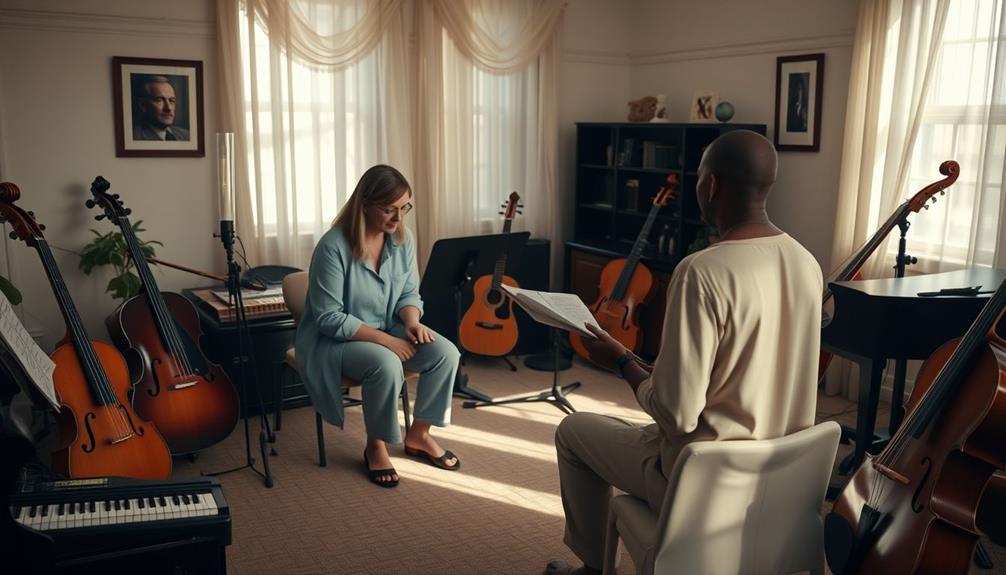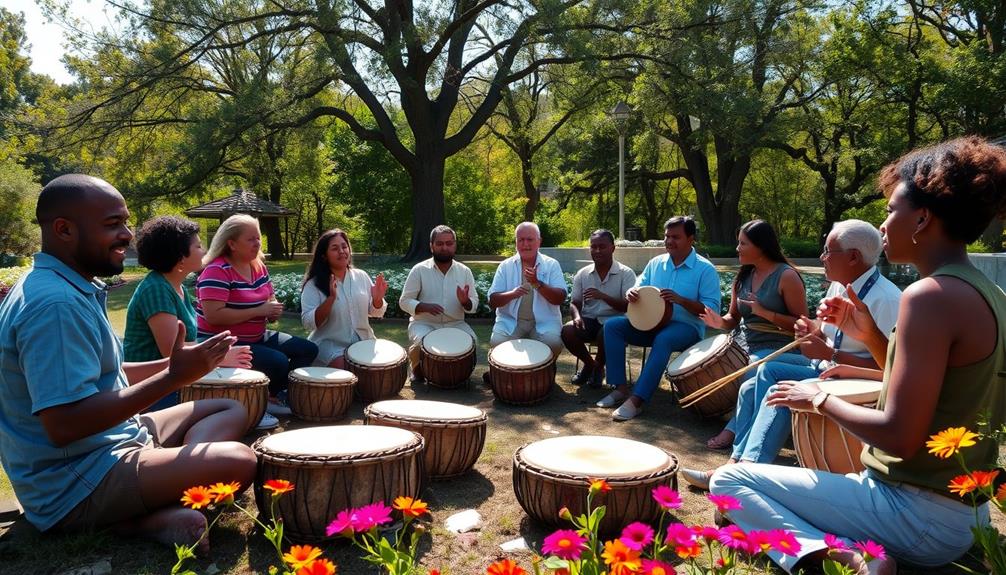Music therapy is a powerful tool for managing grief and bereavement. It helps you express complex emotions through creative outlets like songwriting and improvisation. Listening to familiar music can evoke cherished memories, facilitating emotional processing and connection with lost loved ones. Engaging in group sessions fosters a sense of community, reducing feelings of isolation. You can explore your personal experiences through lyrics and create meaningful songs that honor your loved ones. This therapeutic journey can be incredibly healing, and there's so much more to discover about how music can aid your grief process.
Key Takeaways
- Music therapy facilitates healing through creative expression, emotional processing, and activities like songwriting and listening to familiar music.
- Engaging in music helps maintain connections with deceased loved ones and promotes emotional well-being during the grieving process.
- Techniques such as lyrics analysis and songwriting provide outlets for expressing complex feelings and memories associated with loss.
- Shared musical experiences in group therapy sessions foster connections, reducing feelings of isolation among those grieving.
- Community resources, including support groups and virtual sessions, enhance access to music therapy and emotional validation during bereavement.
Understanding Grief and Loss
Grief and loss are intertwined experiences that can profoundly affect your emotional and psychological well-being. The holiday season often magnifies these feelings, making it harder to steer through the mourning process.
If you've experienced loss, you might find that recent events, like the COVID-19 pandemic, have intensified your grief due to the significant loss of life and complicated mourning experiences. Understanding grief as a profound emotional change is essential for your healing journey.
Additionally, it's important to recognize that mental health support is indispensable during this time, as emotional challenges can arise and complicate the grieving process.
Dr. Alan Wolfelt's Six Needs of Mourning framework highlights essential tasks, like acknowledging reality and embracing pain, which can aid you in processing your emotions. It's important to remember that grief isn't a linear process; it ebbs and flows, requiring patience and self-compassion.
Music therapy can be a valuable tool in this journey, providing an outlet for emotional expression and helping you connect with cherished memories of the deceased. By engaging with music, you can explore your feelings in a safe space, allowing for deeper reflection and understanding.
Surround yourself with supportive individuals and coping mechanisms, as they play a significant role in managing the complexities of grief.
The Power of Music Therapy

Music therapy offers a powerful avenue for healing, allowing individuals to process their grief through creative expression. During music therapy sessions, you engage in activities like songwriting, improvisation, and listening to familiar music, which can help you cope with grief. These techniques promote relaxation, reduce anxiety, and enhance your overall well-being, making music an effective tool during this challenging time.
Incorporating relaxation techniques, such as deep breathing or meditation, can further enhance the benefits of music therapy, creating a holistic approach to healing yoga for back pain management.
Research shows that music can evoke memories of your loved ones, facilitating ongoing connections that provide comfort throughout the bereavement process. With personalized music therapy sessions tailored to your unique needs, you experience a therapeutic journey that addresses not just emotional aspects, but also physical and spiritual dimensions of grief.
Additionally, evidence supports that music therapy can prevent prolonged grief disorder by fostering social connections. Shared musical experiences create a sense of community and emotional support, making you feel less isolated in your journey.
As you navigate your healing process, embracing music therapy can be a transformative step, empowering you to express your emotions and remember those you've lost while moving forward with your life.
Techniques for Emotional Expression

You can explore your grief through lyrics analysis, uncovering emotions that are often hard to articulate.
By engaging in songwriting, you'll find a powerful outlet for expressing your thoughts and memories.
Utilizing AI-generated music can also inspire new perspectives on your feelings and experiences.
These techniques not only facilitate emotional processing but also foster a deeper connection to your healing journey.
Lyrics Analysis Techniques
Utilizing lyrics analysis in therapy can be a powerful way to express and process emotions surrounding loss. This technique allows you to examine song lyrics, which can provide the language for the difficult feelings you might struggle to articulate. By connecting your experiences to the themes in the lyrics, you can gain insights into your grief and facilitate healthy discussions about your feelings.
Additionally, just as cats exhibit emotional attachment to their owners, you can discover parallels between your emotional responses and the sentiments expressed in the lyrics.
As you identify key phrases or emotional triggers within the lyrics, you may find that your emotions resonate with the sentiments expressed in the songs. This process not only validates your feelings but also fosters a sense of understanding and connection. It can encourage you to reflect on memories associated with your loved one, honoring their memory through the shared experience of music.
Engaging in lyrics analysis can help you explore emotions that might be overwhelming or hard to face alone. Through this exploration, you can uncover layers of meaning and find solace in the artistry of music that mirrors your own journey.
Ultimately, this technique can play a significant role in guiding your grief, providing comfort and clarity during a challenging time.
Songwriting for Healing
How can songwriting serve as a powerful tool for healing in times of grief? Songwriting allows you to articulate feelings related to grief and loss, promoting emotional expression and reflection. By engaging in this creative process, you can externalize difficult thoughts and memories, making it easier to confront your emotions.
This holistic approach to emotional well-being can be even more effective when combined with practices like stress management techniques that enhance your overall resilience.
One effective technique is fill-in-the-blank songwriting, which offers structured cues to guide you through your feelings. This format can help you articulate complex emotions that might otherwise be challenging to express. Additionally, analyzing the lyrics you create can provide valuable insights, facilitating deeper conversations about your grief in a therapeutic setting.
Crafting personalized songs fosters a connection with the deceased, serving as a meaningful way to honor their memory while exploring your ongoing relationship with them. As you engage in songwriting, you may experience emotional release, which supports your coping mechanisms and aids in personal growth.
Ultimately, songwriting for healing can be a transformative practice, allowing you to navigate your grief and loss in a creative and supportive way. Embrace this powerful tool and let your feelings guide your pen.
Coping Strategies With Music

During the grieving process, music can play an essential role in coping with loss. Listening to music serves as a significant coping mechanism, helping you validate your emotions and process the complex feelings associated with grief.
Music therapy interventions can enhance your mood and provide distraction, allowing you to find solace amidst the pain. Additionally, incorporating essential oils for relaxation alongside music can further promote emotional well-being and stress relief during this challenging time.
One effective strategy is to create personalized playlists that resonate with memories of your loved one. These playlists can foster ongoing connections, serving as a comforting presence during difficult moments.
Engaging in active music listening not only promotes reminiscence but also encourages discussions with others, facilitating connections while you navigate your grief.
Another valuable coping strategy is songwriting. Techniques like fill-in-the-blank prompts provide structured opportunities for emotional expression, helping you externalize thoughts and memories related to your loss.
By engaging in these activities, you can better process your feelings and find a sense of relief. Incorporating music into your daily routine can lead to improved emotional well-being during bereavement.
Support Systems in Grieving

A strong support system can make a world of difference in your grieving process. Surrounding yourself with a network of friends, family, and support groups offers emotional validation and shared experiences that can ease the burden of loss. Engaging in group sessions allows you to express feelings and memories in a safe environment, fostering community among those who understand your pain.
Consider utilizing a music therapist, who can provide tailored coping strategies and guide you through your emotional journey. Professional support like this can help you navigate your grief more effectively. In today's digital age, creative virtual connections, such as video calls, guarantee that your support system remains intact, even during times of isolation.
Here's a quick overview of support systems in grieving:
| Support Type | Benefits | Examples |
|---|---|---|
| Peer Support Groups | Shared experiences, emotional validation | Local grief support meetings |
| Music Therapy | Coping strategies, emotional expression | Sessions with a music therapist |
| Virtual Connections | Ongoing support, engagement during isolation | Video calls with friends or family |
Embrace these options to help you through your grief journey.
Healing Through Musical Connection

Building on the support systems we've discussed, healing through musical connection can offer profound benefits in your grieving process. Music therapy serves as a powerful tool to facilitate emotional expression, allowing you to articulate the complex feelings of loss through songwriting and improvisation.
During a music therapy session, engaging with familiar songs can evoke cherished memories and maintain a sense of connection with your loved ones, despite their physical absence. Incorporating elements of mind-body connection can further enhance the therapeutic experience, as it encourages a holistic approach to healing.
Active participation in music-making, whether it's singing or playing an instrument, releases endorphins, enhancing your mood and providing comfort as you navigate your grief. This engagement helps you manage the pain by creating a space for healing.
Additionally, listening to soothing music in a curated playlist can lower cortisol levels, reducing anxiety and emotional distress, while grounding you in the present.
In music therapy, the combination of familiar tunes and active participation fosters emotional stability, allowing you to reflect on memories while moving forward. By embracing this musical connection, you can find solace and strength during one of life's most challenging times.
Let the power of music guide you on your healing journey, reminding you that you're not alone.
Benefits of Music in Bereavement

Music can be a powerful tool for expressing your emotions during grief, helping you release feelings that might be hard to articulate.
Engaging with music production basics can enhance your experience by allowing you to create personal soundscapes that resonate with your feelings.
By connecting with memories through familiar songs, you can maintain a bond with your loved one while managing your loss.
Additionally, using music as a coping mechanism offers healthy ways to process your grief and find support from others who share similar experiences.
Emotional Expression Through Music
Grief can be an overwhelming experience, often leaving you struggling to find the words to articulate your feelings. Music therapy can provide a safe space for emotional expression, allowing you to explore and share your grief through various activities like songwriting and improvisation. Engaging with familiar music not only evokes cherished memories but also helps you process complex feelings associated with loss.
| Music Activity | Emotional Benefit |
|---|---|
| Songwriting | Helps articulate feelings |
| Listening to Music | Elicits memories and emotions |
| Improvisation | Encourages spontaneous expression |
Research shows that music acts as an essential tool for emotional validation. When you listen to or create music, it can promote relaxation and alleviate anxiety, enhancing your emotional well-being during this challenging time. Moreover, music serves as a comforting presence, allowing you to navigate your grief journey while fostering an ongoing connection with your loved one, despite their absence. By embracing music, you can find a unique path to emotional expression that resonates deeply within you.
Building Connections With Memories
A powerful connection often emerges when you engage with music that reminds you of a lost loved one. Familiar songs can evoke vivid memories of shared experiences, helping you honor and celebrate their life. This process is essential in your journey to work through grief.
Music can help you reconnect with those cherished moments, facilitating emotional expression in a way that words sometimes can't. Engaging in music can also promote emotional well-being, much like how play encourages creativity and imagination in children the importance of play.
Music therapy techniques, such as songwriting and improvisation, allow you to articulate your feelings and reflect on your memories. As you create or listen to these melodies, you might find comfort and solace, which can ease the burden of loss. Music therapy benefits for insomnia have also been widely recognized, as soothing melodies can help to calm an overactive mind and promote relaxation before sleep. By engaging with music as a therapeutic tool, you may find it easier to establish a sense of peace and routine in your daily life. Over time, this practice not only fosters emotional healing but also supports overall mental and physical well-being.
This connection can also open the door for conversations about grief, making it easier to share your emotions in therapeutic settings.
Research shows that music can enhance emotional stability, making it an effective medium for processing the complex feelings associated with bereavement. By engaging with music that resonates with your experiences, you create a safe space to navigate your emotions and foster healing.
Ultimately, music becomes a bridge to the past, helping you maintain a bond with your loved one while you continue your journey forward.
Coping Mechanisms for Grief
Engaging with music can serve as a powerful coping mechanism during the grieving process. Whether you're passively listening or actively making music, it provides comfort and validates your emotions. In hospice care and various settings, music therapy offers different areas of support that can enhance your healing journey.
Here's how music can help you cope:
| Music Activity | Benefits |
|---|---|
| Passive Listening | Validates emotions, provides comfort |
| Active Music-Making | Releases endorphins, reduces cortisol |
| Songwriting & Lyric Analysis | Facilitates emotional expression |
| Group Music Therapy Sessions | Encourages social connections |
Creating playlists of meaningful songs can evoke cherished memories of your loved one, helping maintain a connection during this challenging time. Group sessions foster shared experiences, allowing you to find emotional support and validation from others who understand your grief. Through these methods, music acts as a lifeline, guiding you through your healing process and promoting emotional well-being.
Community Engagement and Resources

Community engagement in music therapy provides essential support for those traversing loss. By participating in group music therapy sessions, you'll connect with others who understand your grief, fostering emotional support through shared musical experiences.
These connections can be invaluable, helping you feel less isolated during difficult times. Additionally, being part of a supportive community can enhance your understanding of complex emotions, similar to how understanding BPD dynamics can improve relationships.
Here are some resources to enhance your experience:
- Monthly Newsletters: Stay updated on workshops, events, and additional support options related to music therapy for grief and bereavement.
- Free Phone Consultations: Take advantage of 15-minute consultations to learn how music therapy can aid your grieving process.
- Virtual Sessions: Participate in creative Zoom sessions to maintain support networks even when physical distancing is necessary.
- Professional Guidance: Work with certified music therapists who can tailor sessions to your specific needs and experiences related to grief.
Personal Growth Through Music Therapy

Personal growth often emerges from the depths of grief, and music therapy serves as a powerful tool for traversing this journey. Through therapy, you can explore and redefine your identity following a loss.
Using music as a medium for self-expression and reflection, you'll find opportunities to articulate complex emotions that often feel overwhelming. Engaging in songwriting and improvisation helps you navigate these feelings, fostering both healing and personal development.
Research shows that music plays a significant role in emotional processing, leading to important personal insights and increased resilience as you cope with grief. By creating playlists or participating in group music-making, you connect with others who share similar experiences, enhancing feelings of community and support.
This connection can be invaluable as you work through your grief. Music therapy encourages ongoing self-discovery and transformation.
As you embrace your grief, you'll also uncover new meaning and purpose in your life through musical engagement. Ultimately, this journey not only helps you process your loss but also empowers you to grow and thrive in ways you mightn't have imagined possible.
Frequently Asked Questions
How Does Music Therapy Help With Grief and Loss?
Music therapy helps you navigate grief by allowing emotional expression through sound. You can connect with memories, process feelings, and find comfort in melodies, ultimately fostering healing and a sense of community during tough times.
What Music Helps With Grief?
When you're dealing with grief, familiar songs often resonate deeply, evoking cherished memories. Music with soothing melodies can ease your anxiety, while lyrics may help articulate emotions, providing comfort and a sense of connection during tough times.
What Are the Three C's of Grief?
Did you know that over 70% of people experience intense emotional turmoil during grief? The Three C's—Crisis, Change, and Challenge—capture your journey, helping you navigate the chaos, re-evaluate your identity, and confront obstacles.
What Are Three Coping Strategies a Person Can Use While Grieving?
When you're grieving, you can find solace in journaling your feelings, connecting with supportive friends, or engaging in physical activity. These strategies help you process emotions and foster a sense of healing during difficult times.
Conclusion
In the symphony of sorrow, music therapy offers a soothing soundtrack to your healing journey. By embracing emotional expression and engaging with supportive systems, you can transform your grief into personal growth. Let melodies mend your heart, creating connections that comfort and console. Remember, every note nurtures your path toward peace. As you navigate this profound process, let the power of music be your guide, granting you grace and strength through each step of your bereavement.










